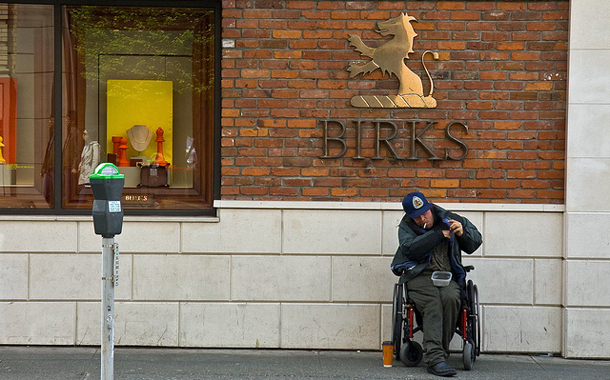With the economy the focus of tonight's leaders debate, some observers will be watching to see how much the discussion speaks to the needs of Canadians who are struggling.
"For a lot of voters it comes down to how they're doing, how their family's doing, whether they can make ends meet," said Trish Garner, a community organizer for the BC Poverty Reduction Coalition.
While some of the leaders have talked a lot about "the middle class," Garner said that leaves the most vulnerable people, many of whom are part of marginalized groups, out of the discussion.
"To put together a meaningful plan, you do need to go beyond the rhetoric of the middle class," she said. "It's good for a communications strategy, but it's perhaps not so good for a meaningful poverty reduction plan."
Focus on the middle class also ignores the growing divide between owners and workers, said Garner. "Wealth is concentrated at the top while the rest find their earnings stagnant and many remain in debt."
Shachi Kurl, a senior vice president with the Angus Reid Institute in Vancouver, said different parties have been talking about the economy in different ways as they each try to reach their likely voters.
Stephen Harper and the Conservatives tend to talk about balanced government budgets, growing the Gross Domestic Product and other macroeconomic topics, she said. "Their base does not have the same amount of anxiety... about what I'd call household economics, or microeconomics."
Haves and have nots
Other voters worry about their incomes, retirement, pensions and job security, Kurl said, adding that NDP leader Tom Mulcair and Liberal leader Justin Trudeau have focused on those issues. For many, it comes down to a question of whether they feel like they're doing better or worse than a year earlier, and how optimistic they feel about the coming year.
She said 44 per cent of survey respondents say the economy is their top issue, a more frequent choice than any other topic. And when related topics such as income inequality, taxes, jobs and federal budgets are added in, it's the top issue for four out of five voters.
"That is a really strong current that's running quite deep," Kurl said.
Angus Reid survey results show that some 47 per cent of Canadians self-identify as middle class, which explains why leaders and parties target so many of their messages to them. At the same time, two out of three Canadians say money is a source of stress at least some of the time, and two out of five describe themselves as "have nots."
Michele Biss is the legal education and outreach coordinator at Canada Without Poverty. Along with Darlene O'Leary, the socioeconomic policy analyst at Citizens for Public Justice, she's been giving a series of 15 workshops across the country on the Dignity for All campaign and the need for a national anti-poverty plan. (The pair, both Ottawa based, will be in Victoria on Thursday for an event.)
"We're putting it on the radar in a very non-partisan way," Biss said. "We've been struck by how people really care and want to see concrete action taken by the federal government."
Bold vision needed
Biss said campaign representatives have met with the four major parties and are seeing elements of their plan appear in the platforms. A list of endorsements on the Dignity for All website includes many NDP and Liberal members of parliament and Green Party leader Elizabeth May, but also two Conservatives.
"We've talked to all parties," Biss said. "It's clear some parties are listening more than others."
All levels of government have a human rights obligation to take action on poverty and the federal government has the tools to make a big difference, she said. And while every province and territory except for British Columbia has adopted or begun work on an anti-poverty plan, "The missing partner here without question is the federal government," she said.
Discussion of the middle class leaves out some 4.8 million Canadians who live in poverty, Biss said. "We haven't heard much about poverty in this election," she said. "I don't know why that decision is being made to not speak to people living in poverty. People in poverty do vote, and people who care about poverty do vote. There has to be some action there."
Many people who are struggling still identify as middle class, O'Leary said, but added, "When [politicians] keep using the tag of 'middle class,' they are completely taking poverty off the agenda."
Garner, whose organization hosted the Dignity for All workshop in Vancouver on Wednesday, said the moral case for reducing poverty is the most important to her, but there are also strong economic arguments. It would be cheaper to address poverty than it is to pay to deal with its symptoms, she said. A national child care plan would boost the economy.
"I'd like to see that kind of thing come out in the debate, but I can't say I'm hopeful that we will," she said. There's public support for action and people want to be inspired by the leaders, she said. "I feel like the public is thirsty for a bold, visionary approach to these issues." ![]()
Read more: Rights + Justice, Politics, Election 2015
















Tyee Commenting Guidelines
Comments that violate guidelines risk being deleted, and violations may result in a temporary or permanent user ban. Maintain the spirit of good conversation to stay in the discussion.
*Please note The Tyee is not a forum for spreading misinformation about COVID-19, denying its existence or minimizing its risk to public health.
Do:
Do not: